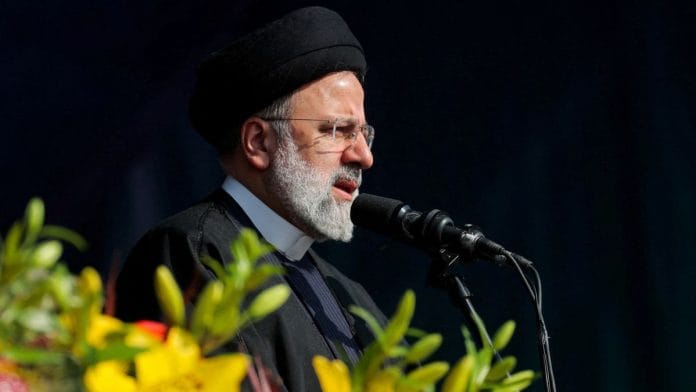New Delhi: Late Iranian President Ebrahim Raisi, who died in a helicopter crash Monday, will be remembered as one of the most hardline leaders in the Middle East, who directed a direct attack on Israel last month following decades of a shadow proxy war between the regional foes. He was also the man who oversaw several brutal executions of his people in the 1980s.
Raisi and Foreign Minister Hossein Amirabdollahian were returning from the Iran-Azerbaijan border on Sunday night after inaugurating two dams there when their helicopter crashed in a mountainous region in northwestern Iran.
After hours of inconclusive reports, Iran’s state media confirmed the deaths of the President, foreign minister and others aboard the chopper on Monday morning. The Iranian Red Crescent later recovered all the bodies from the crash site.
Raisi’s death comes amid heightened regional tensions owed to the war in Gaza, where Israel is fighting Hamas, an Iran-backed Palestinian militant group.
Though questions loom over whether the death will create a political vacuum in Tehran, vice-president Mohammad Mokhber will temporarily lead the nation.
Mokhber, as mandated by the Iranian constitution, will serve as interim president for a maximum of 50 days following which a special council will arrange elections in the country.
Prime Minister Narendra Modi and External Affairs Minister S. Jaishankar expressed shock and sadness over the deaths of Iran’s top leaders, adding that “India stands with Iran.”
It’s unlikely that the deaths of Raisi and Amirabdollahian will affect Iran’s foreign policy in a major way, given Supreme Leader Ali Khamenei has the last word on such matters.
However, this may affect the coordination of its proxies in the region, explains Bashir Ali Abbas, research associate at the Council For Strategic and Defense Research (CSDR).
“Raisi and Amirabdollahian were foot soldiers for a very deep-rooted and historic position that Iran has maintained against Israel. The loss, if any, is going to be felt more in Abdollahian’s death given that he had significantly more experience than Raisi in coordinating with Iran’s proxies. So it’s more of a question in terms of how well Iran executes its regional policy, than whether there will be any change,” Abbas told ThePrint.
Also Read: ‘Win-win deal’: India, Iran sign 10 year contract for Chabahar Port amid Gaza war
Who was Raisi
The 63-year-old Raisi, once believed to be the front-runner to succeed Iran’s Supreme Leader, served as the eighth president of the country from 2021 until his death Monday.
An ultraconservative cleric, prosecutor, and politician — he played a prominent role in the executions of political prisoners in the 1980s while serving as the prosecutor general of Tehran between 1989 and 1994, shortly after the Iranian Revolution took place.
Raisi served on the four-member committee, often referred to as the “death commission”, that sentenced thousands of political prisoners in Iran to death. This earned him the nickname, “Butcher of Tehran”.
The executions he oversaw were mainly of people believed to be non-followers of the regime or supporters of Saddam Hussein.
Raisi went on to occupy important roles in Iran’s judiciary. For a decade, he served as the deputy head of the judiciary (2004-2014) and later in 2019, he was appointed by the Supreme Leader as Chief Justice.
After this key appointment, he said in a 2019 rally to the national assembly of Islamic Revolutionary Guard Corps commanders: “We will not cut the fingers of those who are corrupt; we will cut off their entire hand.”
In 2017, Raisi made his first bid for the presidency but lost to Hassan Rouhani, the moderate cleric viewed as a reformist, who as president, had inked the 2015 nuclear deal with the US and other world powers.
In 2021, Raisi successfully clinched the presidency, which many analysts said was because Khamenei “fixed the contest” in his favour.
Like the Supreme Leader, Raisi would wear a black turban, indicating he is a Sayyid — a descendant of Prophet Muhammad.
In November 2019, the US sanctioned Raisi as part of the Supreme Leader’s “inner circle” who carried out an agenda of “terror and oppression”.
“Raisi was involved in the regime’s brutal crackdown on Iran’s Green Movement protests that followed the chaotic and disorderly 2009 election,” stated the US Treasury at the time, adding that he also participated in a so-called “death commission,” which killed several political prisoners in 1988.
Who is acting Iranian president
Iran’s Supreme Leader has appointed Mokhber as the acting President, who has also been sanctioned by the European Union (EU) and the US in the past.
Mokhber has held several key positions, notably as head of a charitable foundation named the ‘Execution of Imam Khomeini’s Order’. This foundation is overseen directly by the Supreme Leader.
In January 2021, the US sanctioned Mokhber as the head of this foundation, which it said has “systematically violated the rights of dissidents” by confiscating land and property. It added that Mokhber was tasked by the Supreme Leader to implement a “resistance economy.”
However, Mokhber is only a temporary replacement, not his successor per se. According to Article 131 of the Iranian constitution, in the case of the president’s death, his “first deputy shall assume, with the approval of the Leader, the powers and functions of the President.”
It adds that a Council — consisting of the Speaker of the Islamic Consultative Assembly, the head of the judicial power, and the first deputy of the President — must arrange for a new President to be elected within a maximum period of 50 days.
(Edited by Richa Mishra)






